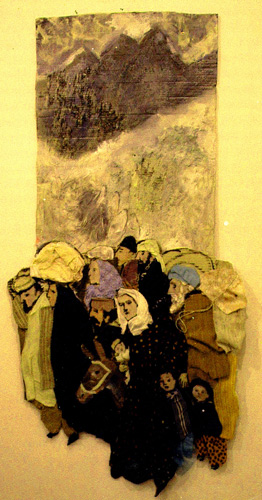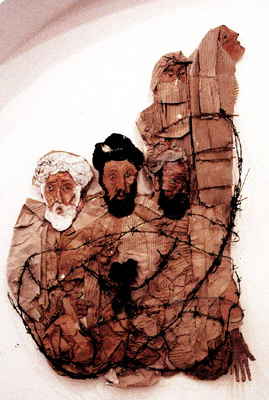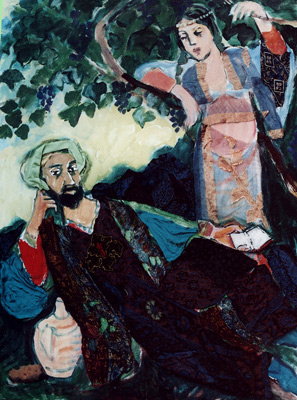This is the story of how I involved myself in a continuous stream of 'activist' painting, one thing led to another, in my usual haphazard way, until suddenly things straightened out to become that magic word - "serendipitous". (You never know how it comes about, till it's there, do you?)
Well, there we were, faced with the bewildering facts of 11th September 2001, and suddenly - too soon after, the Dragon of War fell on poor Afghanistan - I depicted it with 2 heads - Greed and Vendetta - the usual excuses for this monstrous mechanism to get under way.
Only this poor martyred country had already been disembowelled by 23 years or so of constant warfare, and its populace held back now by the sinister Taliban. Which meant untold suffering and humiliation, especially to the women, virtually under house arrest for years. 23 of their 28 laws were directed against women it seems, leading to many suicides.
Being one myself, I found myself seething with anger. Was losing your all the only path to freedom? Anger being a great propulsor for creativity in a meek person like me, I found myself siezing cardboard boxes, rags, earth, even cinders - to crush and mould them into my re-occurrent visions of Mountains & Men (and women) fleeing from War. Even the cats helped, using my cardboards as scratching posts, preparing textures for the paint and glue to leak into, to become the Mountains of Afghanistan, towering over the crowds of refugees.

The ambiguous or pompous titles given to operations there, like 'Collateral Damage', or 'Enduring Freedom' - well, the first gave the title to what was gradually becoming an exhibition - a whole village wiped out in the first week of war. Whereas Enduring Freedom was the old men arriving at the Pakistan border and finding barbed wire round them, their women raising their heads in mute despair.

It rained on them while I was doing it - so I crushed up the forms more like a sculpture. Poor materials for an even poorer content. Then when they thought of returning to normal they had a Wedding of 70 people - all bombed out of existence (including the bride), in an operation I suppose could be excused as Friendly Fire. I suspect the wedding guests fired their guns up in the air 3 times to celebrate, and the ignorant bombers coming overhead panicked... Here the question asks itself. "Is it better to learn a little about the culture of the people you are going to kill - or should one encourage a blissful ignorance???
Now that aggression is carried out by merely pressing a button, maybe a new code of war ethics should come about? How to help the aggressor feel better, rather than return home as often happens, a neurotic wreck, humanly undermined... For each victim dead, there's a sick one back home, much of the time.
Anyway, strangely enough (you wouldn't think pictures so painful would sell) - I sold 5 in the first show of 'Collateral Damage' at Noce. Not wanting to keep money based on the pain of victims, I decided to take the money up with me to Milan, where we were due to do shadow theatre at Teatro Verdi. I wanted to devolve the modest sum to RAWA, which was run by the women in Black, and now was for the protection of Afghan Women and Children.
So I met that wonderful organizer, Laura Quagliolo, deep voiced and ginger-haired, who goes to Afghanistan or Pakistan every year for the 8th March, with a delegation. Within an hour she invited me to come too. Which I did.
Knowing we would be visiting orphanages in Rawalpindi and Islamabad, I took a whole big bag of shadow-puppet material with me - one never knows! So one misty morning in Milan, we 7 women met. My ticket had been taken under my pen-name in Milan, and my visa via the European Parliament under my maiden name, and the airport refused to consider I might be one and the same person... so after a moment of panic, not to see my working material take wing and depart without me, we procured a second ticket... I didn't realise it then, but I had a winning card up my sleeve, in the form of a book of the stories of Nasruddin Hodja (among Afghans - Mullah Nasruddin). All of a sudden I realised this would be ideal material on which to base work with the children. So at every stop I would tell these witty, surreal stories (in English, then translated) and all the children had their own versions, which they then told. I was glad it was all to do with their very own ancient hero, even though we could work on it all in only a few places, to rudimentary effect, but much joy of the children.
The moment a few women could get together with a sewing-machine they produced superior artefacts - and we were happy too. After a visit to the free Afghan hospital of Malalai, where a sea of tribal women stared at one (only Carla would be brave enough to photograph anywhere) and the embarrassed realisation that most of the eye medicines our opthalmist had brought were out-of-date. We moved on to the great refugee camp at Peshawar, of 7,000 people. (We didn't know that the visit of foreigners indirectly produced an attack of terrorists on that little hospital a day or two later, and the doctor who was the night guard barely escaped with his life, saved by removing him to the Italian consulate.)
Peshawar was quite something, rows of domed houses in between open rivulets of water where a few dirty ducks paddled and hens scratched. Each house had running water, a gift from international sources. There were many schools for all ages, boys and girls together till 12, then separated. The teachers seemed to be hardly older than the pupils. The sparse exercise books now showed drawings of flowers and birds instead of the planes and sausage bombs dropping, and scared mothers fleeing, in the drawings of children I saw in a video of less than a year before. So they must be curing themselves of their war traumas...
Outside the vast camp all around were yellow brickfields, tall chimneys and little groups of labourers from the camp. The men worked by day, the women by night when the wolves roamed, and the children whenever they could. If it was desired to extract a child from this labour, so that he or she could go to school, the director of the Camp had the bright idea of giving a big bag of rice once a month to that family, in exchange for the loss of their child's breadwinning contribution. The schools were full, so there must have been mountains of rice for their parents! But the brickmaking prospered all the same.
In the other orphanages we had seen no child was devoid of some extended family, but often parents even from far-off Hunza, would send their boy there for an education.
There was an efficient little hospital in the camp too, with a charismatic doctor. There was a room for the exercises of pregnant women. And even a showcase of possible prophylactics from which to choose. Most women chose an occasional injection as being least visible to their husbands.
I wondered if they had begun to forget the know-how of herbal cures by now, seeing rows of eucalyptus trees no-one knew to use for coughs and colds it appeared. Maybe with a mined countryside one can no longer enjoy roaming round collecting herbs...
In Peshawar Market one could find antique tiles and dishes. From where are they taken?
Some time later I heard the Pakistan Army had requisitioned the nice little huts of that camp, and everyone left for Afghanistan. I could imagine them, some by lorry, some by donkey or bicycle, in long files plodding to Kabul; only to be faced by ruined or occupied homes, and no work to be found.
All those dedicated Afghan women (and some men) - devoted to the cause of bringing up little Afghans to one day return to their rightful places, having had to work for years perpetually on the wing, often secretly. They themselves were the children of Afghan intellectuals put to death by the pro-soviets as dangerous potential leaders of some revolt, as the first Afghan poetess had been, in the 70s.
Now the kalashnikovs so lavishly sent to help the Mujahadeen in their battle, had passed into the hands of the sinister Taliban, not so long before. Little did we know how soon they would lift their heads, reborn, and again begin to dominate in many places, Afghanistan and Pakistan.
Meanwhile the Iraq war was starting next day, and as I saw how near Bahgdad we would be flying, I preferred to return, not to be taken for a missile by mistake! When I left my big bag of shadow puppet material in Pakistan, the orphanage father said "Even if you come back in a year you'll find it all there waiting for you!" Alas, I could not go back, as yet, and those children needed a continuity of interest. So did everyone.. Let us never forget them...


